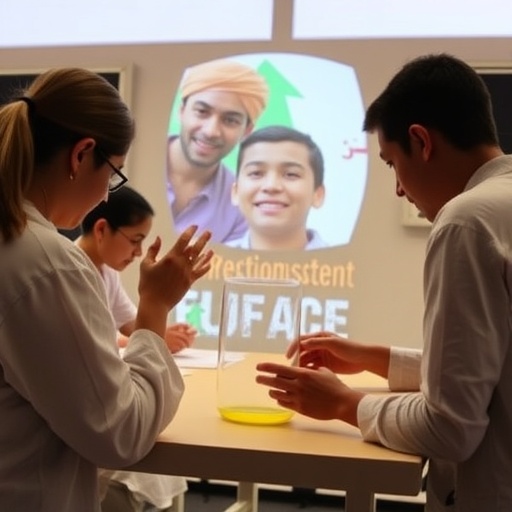In recent years, the interface between education and the understanding of scientific principles has gained substantial attention worldwide. A pivotal study conducted by Takriti, Al Amirah, and Rabbani explores the essence of professional development in shaping educators’ perceptions of the Nature of Science (NOS). This investigation is particularly significant in the context of early years science education in the United Arab Emirates (UAE), where the educational landscape is rapidly evolving. The findings of this research are not only illuminating for the region but have broader implications for global educational practices aimed at enhancing scientific literacy.
The study meticulously examines how professional development can influence teachers’ views of science’s intrinsic nature. The underlying premise is that educators’ beliefs about NOS are crucial in shaping their instructional methods and ultimately the learning experiences of their students. By elucidating the relationship between teacher perceptions and pedagogy, this research seeks to highlight the critical role that ongoing professional learning plays in educational efficacy.
One of the core elements of this research is the notion of NOS, which refers to the values and assumptions inherent to the discipline of science. Understanding NOS is foundational, as it informs how science is taught and learned. Teachers who possess a nuanced understanding of NOS are better equipped to foster an environment where inquiry and critical thinking flourish. This study sheds light on the gaps that often exist in teachers’ conceptualizations of NOS and how targeted professional development can bridge these gaps.
The results indicate a compelling correlation between formal training and enhanced understanding of NOS among educators. As the study illustrates, the professional development initiatives that focused on deepening teachers’ comprehension of the philosophical underpinnings of science yielded significant changes in their instructional practices. This indicates that educational policies should prioritize robust training programs that emphasize the intricacies of NOS.
Moreover, the findings revealed that teachers who participated in this professional development program reported a marked increase in their confidence and enthusiasm towards teaching science. This not only benefits the educators themselves but also creates a ripple effect on the students. Increased teacher confidence often translates into more engaging and effective science instruction, fostering a classroom environment ripe for exploration and discovery.
A particularly noteworthy aspect of the study is its focus on the early years of education. The authors argue that early science education is critical in shaping students’ perceptions and interest in science as they progress through their educational journeys. Therefore, equipping teachers with a solid understanding of NOS at this formative stage can ignite a passion for science that lasts a lifetime. This underscores the importance of emphasizing NOS in teacher training programs, especially in regions where science education is still developing.
As the UAE positions itself as a leader in educational reform, this research serves as a vital resource for policymakers and educators alike. By investing in comprehensive professional development programs that target NOS understanding, the UAE can enhance its science curricula and bring about meaningful change in educational outcomes. This strategic approach to teacher training is not simply an investment in individuals but an investment in the future of science education as a whole.
Additionally, the study’s authors recognize the growing demand for a science-literate populace in an age dominated by technology and innovation. As global challenges increasingly require scientific understanding—from climate change to health crises—there is an unmistakable need for educational systems to effectively prepare students for these challenges. By fostering a solid foundation in scientific principles through informed teaching practices, the UAE can produce a generation that is not only scientifically literate but also equipped to contribute to solving these pressing issues.
The researchers conducted their study through a mixed-methods approach, employing both quantitative and qualitative data collection techniques. This robust methodology allows for a comprehensive analysis of the professional development program’s impact. By juxtaposing statistical data with personal accounts from participating teachers, the study paints a detailed picture of how professional development can reshape educational paradigms.
In conclusion, the remarkable insights gathered from this study underscore the significance of professional development in early years science education. The authors encourage educators and policymakers to recognize that investing in teacher training is tantamount to investing in the future of science education. As the landscape of education continues to evolve, embracing strategies that enhance educators’ understanding of NOS will be pivotal in cultivating a scientifically literate society.
As we look to the future, the message is clear: enhancing teachers’ perceptions of the nature of science is not only about improving their knowledge but also about enriching the educational experiences of countless students. This research is a stepping stone towards fostering a culture of scientific inquiry and critical thinking that is essential for navigating the complexities of the modern world.
Subject of Research: The impact of professional development on teachers’ views of the Nature of Science in early years education.
Article Title: The Impact of Professional Development on Teachers’ Views of Nature of Science (NOS): A Study on Early Years Science Education in the UAE
Article References:
Takriti, R.A., Al Amirah, I., Rabbani, L. et al. The Impact of Professional Development on Teachers’ Views of Nature of Science (NOS): A Study on Early Years Science Education in the UAE. Early Childhood Educ J (2025). https://doi.org/10.1007/s10643-025-01953-4
Image Credits: AI Generated
DOI:
Keywords: Nature of Science, Professional Development, Early Years Education, UAE, Teacher Training, Science Literacy.




